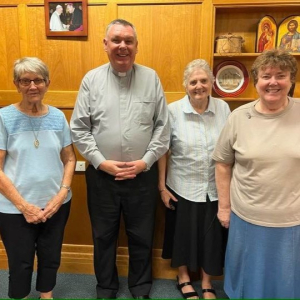Peter MALONE
Sister Rita Grunke OLSH, from Sudan to Hughenden
Sister Rita Grunke OLSH, from Sudan to Hughenden
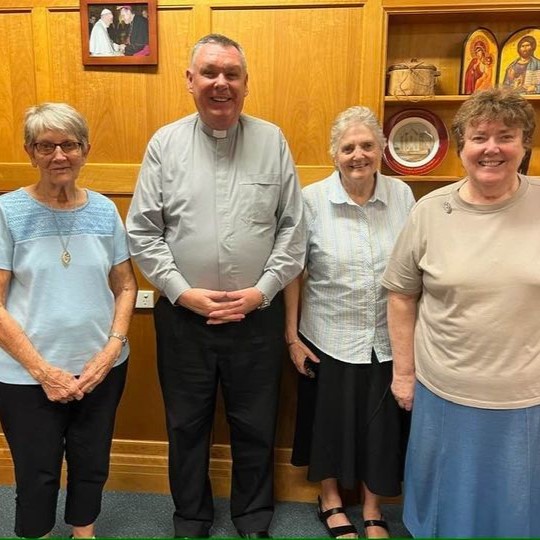
From the Bishop of Townsville. Timothy Harris
“We welcome Sr Rita Grunke OLSH (on my right) to the Diocese . Sr Rita joins Sr Gerardine Doherty OLSH our Clergy Formation Director and Sr Christine Martin OLSH. Sr Rita has volunteered to be a pastoral presence in Hughenden. The Hughenden Catholic Community in particular is looking forward to having Sr Rita live with them and be there for them. We are delighted to have Sr Rita with us. May the Sacred Heart of Jesus be everywhere loved. +Tim”.
We are posting again this write-up of Rita to remind us of her ministry for so long in Sudan.
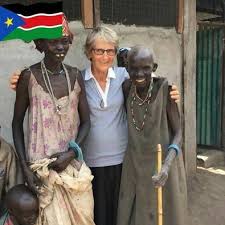
By ACI Africa Staff, Rumbek, 24 October, 2023 / 8:45 pm (ACI Africa).
Sr. Rita Grunke, an Australian member of the Congregation of the Daughters of Our Lady of Sacred Heart (OLSH), who is leaving South Sudan for her native country after two decades of service in Africa looks back at her experience in the world’s newest nation with appreciation.
“Rumbek Diocese has offered me the opportunity to be a missionary really into the heart of the communities, women, and family life, and other services to the community,” 82-year-old Sr. Rita has told ACI Africa in an interview, recalling her 19-year apostolate in the South Sudanese Catholic Diocese.
Set to leave South Sudan for Nairobi on Wednesday, October 25 before proceeding to Australia a few days later, Sr. Rita joined members of her Religious Congregation at St. Josephine Bakhita Mapuordit Parish of the Catholic Diocese of Rumbek when she arrived in South Sudan in 2004. She joined late Sr. Mary Batchelor who had arrived in the South Sudanese Catholic mission in 1996.
Speaking to ACI Africa on Monday, October 23, after her farewell party over the weekend, Sr. Rita recalled her first encounter with “real suffering” when she arrived in Rumbek Diocese that was under the leadership of the late Bishop Caesar Mazzolari.
“When I first came it was really the plight of the women that touched my heart because it was the first time I saw real suffering among the women,” the OLSH member said, and added, “Polygamy has severe effects on family life and mothers carry the weight of the family; they gather school fees and look after the children.”
She recalled the initiatives she had with various stakeholders in view of empowering women around St. Josephine Bakhita Mapuordit Parish.
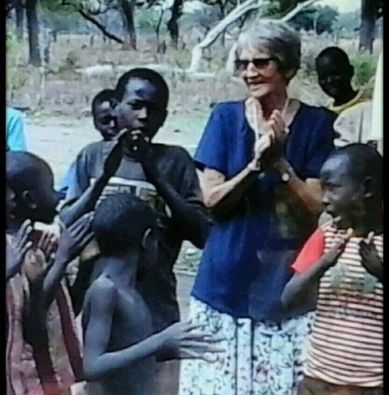
“When I first came, we had groups; we had community meetings with mothers and government representatives,” Sr. Rita recalled, adding, “We tried in those meetings to bring families together in order to support the mothers.”
Over the years, she has facilitated the realization of “simple gardens”, having embarked on farming through irrigation as “the real empowerment”, the Australian Catholic Nun who has been known for facilitating the drilling of boreholes for local communities in Rumbek Diocese told ACI Africa, taking pride in the fact that through the initiative, “many different groups of women have gardens.”
“Women have got greens, tomatoes, pawpaw, and onions,” she further said, and added, “I have worked a lot through agriculture trying to support the mothers to support and look after their children in a healthier lifestyle.”
The OLSH member who said she “arrived in Africa at the end of 2003 and in South Sudan in January 2004” went on to describe her service in the world’s youngest nation as “a beautiful occasion” and the Diocese of Rumbek as “a beautiful place”.
“I have really enjoyed this time in South Sudan,” she reiterated, and added, “It is a kind of mission that I really wanted to come to. I was impressed with the foundation OLSH members laid.”
Sr. Rita continued, “I had followed in the footsteps of the pioneering sisters; they were a source of inspiration and it is my joy to be part of them in the Diocese of Rumbek and in Mapuordit.”
OLSH pioneer members in Rumbek Diocese, she recalled, “talked about the people; they talked about poverty; they talked about so much that really appealed to me and I really wanted to be able to be part of that mission.”
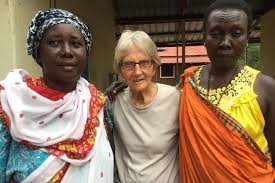
“I’m leaving Mapuordit; I’m going back to Australia because I am already at a certain age and health begins to diminish,” Sr. Rita told ACI Africa during the October 23 interview.
While in Australia, Sr. Rita said she would take up “simple things in a small rural parish.” “I hope to guide a rural Catholic Parish as a pastoral person, to do catechetics in schools,” the Australian OLSH member said.
And now that is happening in Hughenden.
Chessplayer, The
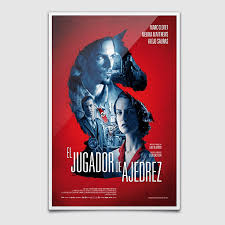
THE CHESSPLAYER
Spain, 2017, 98 minutes, Colour.
Marc Clotet, Melina Matthews, Alejo Sauras, Lionel Auguste, Stefan Weinert, Mike Hoffman.
Directed by Luis Oliveras.
The Chessplayer offers a different perspective on World War II. The director has said that it is a film not about war, not about chess, but about human beings. In fact, it combines all three elements.
The film opens in 1934 with a chess match, the emergence of a Spanish champion, Diego. A French journalist is observing the game, not understanding it, but attracted to Diego when she interviews him. They marry, begin a family. They lived through the period of the Spanish Civil War.
But, as the years pass, they take refuge in Paris, especially helped by the wealthy Pierre. The family is successful in Paris but, when the war breaks out, Diego is arrested and charged with being a spy.
What follows is harrowing for Diego but also harrowing for the audience as we watch Diego’s plight, the treatment in prison, the interrogations, the humiliation, the false accusations, encounters with other prisoners, executions, torture.
However, he experiences some respite when the German commander is enthusiastic about chess and asks to play with Diego, surprised at his skills, playing, learning from him, and this taking place over a number of years. The commander has urged Diego to write to his wife every month but there are no replies.
And the film continues sad with the end of the war, the retreat of the Germans, Diego free, gradually returning to his family, his wife thinking him dead now married to Pierre. Audiences have been identifying with Diego throughout the film but, especially here, difficulties of travelling to find his family, the encounter with his wife, with his child, some evocative memories within her of the past and his teaching her chess. And, an open ended finale.
A compassionate war film to be recommended.
- A World War II film? Spanish perspective? French perspective? German perspective?
- Political perspectives, torts the Spanish Civil War, the Franco regime, Germany in World War II, the invasion of France, occupation of Paris? Resistance groups? Spies?
- The designation of times, Spain during the Civil War, in the aftermath, free France, occupied France, the years passing in the prison? The liberation of France?
- The focus on chess, audience interest in chess, knowledge, the range of games, moves, explanations of theories? The opening of the film, Diego and the match against the champion, his reticence, doubts about his winning, Javier and encountering Marianne, his confidence, her work as a journalist, thinking she had made a mistake? Diego and his victory, the reaction of the champion?
- Javier arranging the meeting with Marianne, the bonds between them, falling in love, the marriage, the birth of their daughter?
- Diego, his personality, quiet, a good man, memories of his father and his encouraging his chess playing, his abilities with the game? Marianne, her personality, French, settling in Spain? Her desire to go back to France, the connection with Pierre, Diego discovering her letter in the drawer?
- The move to France, Marianne and friendship with Pierre, her work? Diego and the time with his daughter, introducing her to chess, explanations of the murders? Chess pieces?
- Diego, calm and loving, taking his daughter out, seeing Marianne with Pierre, her initial lying, her explanation of the truth? The effect on him?
- The arrival of the police, his arrest, no explanations, the rough treatment, stripped, searched, in the cell? His bewilderment? Accused of espionage? The others in the cell, his talking with role, roles that his back story? Support of Diego, building the chessboard, the pieces, the authorities smashing them? Life in the cell, dismal, the names of the prisoners called out, their being taken to execution?
- Marianne, going to Pierre, the plea with the Minister, the promise of Diego is being freed, Marianne keeping vigil, is not coming out? Her going to the official, the confrontation, her being told that Diego was dead, executed? Her sadness, her distance from Pierre, the meetings, his friend home and shelter? Her waiting?
- Diego, called out, the rough treatment of the German guards, brutality, mockery, laughing at their brutal treatment of people? Is not going to execution, is guided to see the commander?
- The interrogation, his saying that he was a chess player, that being considered not a job, warehouse supervisor instead? But the commander interested in the chess, the initial game, his being seated, Diego standing, the moves, the commander thinking had been defeated, Diego causing him to hesitate, the return, the finale of the game?
- Diego going back to his cell, talking with role, their working together? Then rolls disappearance? Diego, summoned to the commander, the various games, the change of clothes, the guards top told not to be brutal, better clothes? The scene of their gleefully hosing him down? A different cell? Diego and the calling out of the names of the men, his passing and watching the firing squad?
- The years passing, the chess games, Diego’s request to write to his wife, the monthly letters, the irony of the commander not sending them out, giving Diego back the cash of letters?
- The revelation that Pierre had betrayed him?
- The Allied invasion, the Germans moving out, the commander letting Diego go, shooting himself, Diego in the street, the brutal German guards, looking at him, their departing?
- Diego wandering, going back to his home, the neighbour giving him the information about his wife, the address, Bordeaux? His walking, the encounter with the Vineyard owner, the lift, the directions to the house?
- Marianne, her amazement, her being married to Pierre, for two years, helping Diego, the bath, the food, his meeting his daughter, her not recognising him? His accepting Pierre and the marriage? Access to his daughter? The scene with his daughter, the chess piece, her initially thinking him a bigger, his shave, and the final touch in the moving moment her saying that she remembered him?
- Diego as a man of integrity, the issue is religion, Catholic, not practising, the commander and the discussion about atheism, whether God had abandoned Diego – but, in fact, God not abandoning him, but saving him throughout the war?
Despite the Falling Snow
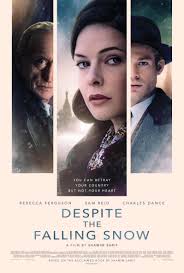
DESPITE THE FALLING SNOW
Canada/UK, 2017, 93 minutes, Colour.
Rebecca Ferguson, Sam Reid, Charles Dance, Oliver Jackson-Cohen, Anthony Head, Antje Traue.
Directed by Shamim Sarif.
Despite the Falling Snow is a film about the Soviet Union, the collapse of the Soviet Union, transitions, espionage. The director, Shamim Sarif, adapted the screenplay from her own novel.
The film has two time eras, the late 1950s in Russia, the early 1960s in the United States. This establishes the main characters, especially the Russian, played by Australian Sam Reid (Interview with a Vampire, The Newsreaders). Then there is Russia in the early 1990s, after the collapse of the Soviet Union, as will the sequences at this time in the United States. The Russian displayed this time by Charles Dance.
There are complexities in relationships, seeming betrayals, efforts to make atonement. The leading character in the later period is played by Rebecca Ferguson (Mission Impossible, Dune).
The film was made in Serbia standing in from Moscow. At the time of this film’s release, even the 1990s was becoming part of Soviet and American history.
- The title? Moscow and snow? Moscow and espionage? Moscow and romance?
- The work of the director, novel, screenplay, production, direction?
- A cold war story? The USSR in the Christian era? The US in the Kennedy era? The transition to 1992, election year for Bill Clinton, the collapse of the Soviet Union, Boris Yeltsin?
- The filming in Serbia, the Moscow sequences, the winter, the streets, the river, the Kremlin, official offices, apartments, schools? The contrast with the US, receptions in the 1960s, apartments in the 1990s? The musical score?
- The introduction, the US reception, 1961, meeting between Soviet officials and Americans? Sasha and his presence, nervy, accompanied, meeting the US contact, his making a run for it, pursued, the car, the photo of his life, the contact had been lost?
- 1959, Sasha, is political career, his parents, friendship with Misha, his boss, severe protocols in secrecy? The meeting with Katia? The attraction? His being used, her getting the documents, her falling in love, mission and his influence, the preparation for the wedding, her hesitancy, her commitment, life together? The romance with Katia? Meal with his parents? His going to the US, the on, security? His boss, the revelation of espionage? Katie telling him the truth, the effect on him, wanting to save her, going to America?
- The film has cut his story, her background, the flashbacks to the brutality against her family, work at school, connections with Misha, the contacts, the documents, passing them on? The relationship with Misha? The relationship with Sasha, using him, his attraction, her attraction, the decision for the wedding, life with Sasha, the revelation of the truth, the dangers?
- Misha, his political affiliations, espionage, photographing documents, passing them to County, his friendship with Sasha? The complications, the discovery?
- 1992, the older Sasha, his war with the documentation, the loss of cut here? With his niece, her artwork? Going to Moscow? His being unwilling to go?
- Laura, artwork, going to Moscow, the Moscow connection, the artwork of cut here, the exhibition? The impact of the art of cardio on visitors, on the audience? Is trying to make connection with Misha?, Personality, reserved? Pretending to make the contact? Lauren, lesbian, her approach to mania? Millions resistance? Telling the truth, the conflict between the two?
- The visit to measure, old age, invented, staying in Moscow? His hostility, drinking? His going to the exhibition, getting the suitcase? Seeing the artwork? Meeting with Sasha? The clash, leaving the suitcase?
- Sasha, going to Moscow, the exhibition, the encounter with Misha, the suitcase, the letter and his reading it?
- The audience seeing the flashback, Misha and the torture, the soldiers, his meeting with Katia, the confrontation, her running, her being shot?
- An espionage story? The Cold War? 30 years later and consequences? But, principally, a romance story?
Teacher Who Promised the Sea, The
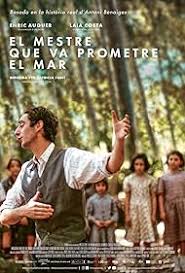
THE TEACHER WHO PROMISED THE SEA/ El mestre que va prometre el mar
Spain, 2023, 105 minutes, Colour.
Enric Auquer, Laia Costa, Louisa Gavasa, Ramon Agirre, Gael Aparicio, Alba Hermoso, Nicolas Calvo.
Directed by Patricia Font.
This is a film with moments of hope but also many moments which are grim. Perhaps the title indicates this – promise but whether the promise can ever be fulfilled.
This film is based on an actual character and events, with tributes and photos during the final credits. The setting is Spain in the mid 1930s, at the outbreak of the Civil War. However, there is a framework for the Civil War story, an elderly man in an aged care home, the concern by his granddaughter about his health, and wanting to know more about his past during the 1930s. The film shows the range of excavations of mass graves which have taken place in recent decades, she’s too horror of the discovery of the skeletons, so numerous, the need for identification – and this all over Spain, a map indicating the number of mass graves.
With her investigations, going to the town where her grandfather lived, finding one of his schoolfriends, the action of the film goes into flashbacks. Especially a focus on the new school teacher, Antonio (Enric Auguer). Antonio has arrived, a friend in the town publishing his articles with socialist bent, trying out various experiments with the small group of children, getting them to participate themselves in their own education, programs, activities. This, of course, causes difficulties, especially with the Mayor whose young daughter is in the class, feeling herself superior to the rest of the children.
The teacher has to look after one of the children, Carlos, whose father is in prison. And this is the young boy who will become the grandfather in the aged care home.
In terms of a film about education, this is the work of the pioneers who want to involve the children in their education and not just be subject to curricula. And, Antonio is atheist. This elicits on the part of the very stern parish priest.
The children have never seen the sea and that is one of the promises that Antonio makes. However, the war breaks out, audiences have seen troops and fascist factions roaming through the village. Ultimately, the military arrives, the village people have to take a stands, Antonio very much supported by the old widow who has been his housekeeper, the mayor taking the side of the troops.
It is sad to see the treatment of Antonio, the response of the children, of the people in the village, his being taken into prison, all put by Carlos’s father, and a particularly plain but moving sequence where Antonio is taken out into the hills, the soldiers having a smoke before casually shooting him.
Audiences have been continually interested in Spanish Civil War stories this is a strong addition to these stories, based on actual characters and events, but continually questioning the behaviour of right-wing extremists.
- Audience interest in Spain, the 20th century, the Civil War, the aftermath with Franco, the 21st century and dealing with the history, the murders, the digging up of the mass graves, younger generations searching for understanding of ancestors?
- The town, in the 1930s, homes, farms, schools, the church? 21st-century and mass grave sites, the excavations? And residents in care? The musical score?
- The interplay between the two time periods? The concern of the present, Carlos in aged care, his daughter, granddaughter, her illness, her own daughter, concerned for her grandfather, his stroke? The information about the graves, the travel, the discussions with Laura, the nature of the excavations, the information, the bones and skeletons, DNA tests for identity? Arianna and her anxiety, disappointment, the discussions with Emilio, his support, going to see Josefina, spurned, her daughter bringing the documents, the examination with Emilio, the return to her grandfather?
- 1935-1936, the political situation, the rise of the fascists, the patrolling of the towns with fascists, the entry of the Army? Anti-communism? The ordinary people of the town, Catholic background, working, their families? The role of the parish priest, his severity – and his look at the end when Antonio had been tortured?
- The story of Antonio, teacher, new appointment, interactions with the Mayor, the children at the school, their families, Carlos and his imprisoned father, Josefina daughter of the mayor, her severe mother, Emilio and his father, unable to read, demanding on his son for work? Antonio and his principles for education, less formal education, more questions, experiments, solutions? Telling stories? The writing of the pieces, compiling the books, printing the books? The effect on the children, their enthusiasms? The issue of the sea, the promise to go there, the reluctance of commissions, the mayor and his wife, Emilio’s father, Antonio reading Emilio’s story, the permission? The episode of the photo and the children’s delight?
- Antonio, atheist, taking down crucifix, respect for faith in the church, his articles in the paper? The mayor and his comments? The hostility of the parish priest?
- Antonio settling in, Charo and her work, the conversations, the gradual warming and friendship, her warnings about his politics, support? Her sadness at his arrest?
- Carlos, unable to read, his father not teaching him, hostility to Antonio, Antonio persuading him to write letters to his father, learning, embracing Antonio?
- Inspector, the mayor and the parish priest, the excellent performance by the students?
- Life in the town, the festivities, the dancing, yet the shadow of fascism?
- Antonio arrested, tortured, bound, drained through the town, everybody watching, the children upset? Into the cell, Carlos’s father helping him? His friend who had supported him with his publications? His being dragged out, into the countryside, the soldiers having their smoke, and the shooting?
- Spain, the decades after Franco, coming to terms with history, and the history of the search for the mass graves?
I'll See You in my Dreams/ 2015
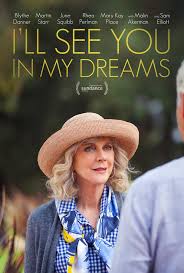
I'LL SEE YOU IN MY DREAMS
US, 2015, 92 minutes, Colour.
Blythe Danner, June Squibb, Rhea Perlman, Mary Kay Place, Martin Starr, Sam Elliott, Max Gail.
Directed by Brett Haley.
The title of the film is that of the popular song of the 40s and 50s, memorably sung by Doris Day in the film with that title.
This is a film for an older audience, especially in older women’s audience. At the centre is a former singer and former teacher, in her 70s, widow of 20 years after the accidental death of her husband, Carol, still living comfortably at home. She is played by veteran actress, Blythe Danner, always sympathetic on screen.
Down the road is a home for aged care with three of her friends, often meeting together, gossiping, playing cards. They are played by veterans Mary Kay Place, Rhea Perlman, there 70s, with June Squibb, still making films into her 90s. They like to gossip about Carol and possible relationships, especially with the young technician, pool cleaner, who visits Carol and has long conversations with her about himself, going to a karaoke bar with her, his composing a song for her. Stop
However, another resident of the aged care home is Bill, played by Sam Elliott with his usual affable charm. Again, a relationship with Carol, together, her being able to reflect on her life more freely with him, on his boat.
The film does not end as we might have expected with a happy relationship. Complications with Bill’s health, complications with the young man’s devotion to Carol, support from the women’s group – and Carol, at this age, having to reassess her life and plan for her future.
- The Title? The old song? Dreams and reality?
- A film about age, ageing, memories of the past, love, coping with the present, into the future? Happiness, sadness?
- The California setting, Carol and her house, garden and pool, the aged care home? The streets, shops, restaurants? Audiences identifying with placing characters? The musical score?
- Carol’s story, widow for 20 years, love for her husband? The past, her singing, the band, her teaching career, stopping singing? Living alone, comfortable? Her friends at the aged care, cards, gossip? The encounter with Lloyd, his reserve, her talking, inviting him for a drink, his relaxing, his attraction to her, karaoke talk, at the bar, their singing, his writing the song for her, singing it? His disappointment at meeting Bill? The later return, Carol encouraging him? Carol playing golf, noticing Bill, his response to her, the invitations, her going out, enjoying the evening, the challenge, listening to Bill’s story, the sexual encounter and the aftermath? With her daughter, the bonds, the discussions, the call to the hospital, Bill’s death? The effect on Carol, plans for the future, travel with her friends?
- The humour of the speed-dating episode, Carol uncomfortable, the range of men and the making conversation within the five minutes?
- The friends and aged care, the different personalities, discussions, gossip, sex issues, playing golf, playing cards, touch of snooping? The response to Carol and Bill?
- Bill, charm, but aged care, his boat, story of his wife leaving and dying, the attraction to Carol, the flirting, the invitation, the dinner, the night together, the plans for the future, on the boat, the proposal, the news of his death?
- Audiences identifying with Carol, with the situation, older generation, younger generation?
Muzzle
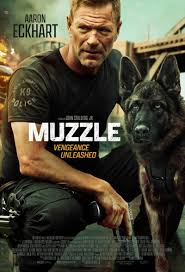
MUZZLE
US, 2023, 93 minutes, Colour.
Aaron Eckhart, Penelope Mitchell, Diego Tinoco, Stephen Lang, Paul Johansson, Nick Searcy.
Directed by John Stalberg Jr.
The title indicates restraining animals. Here, in the K-9 department of Los Angeles, there are police dogs, especially one in the opening sequences called Ace, then an attractive dog later in the film, Socks. However, the central character, Aaron Eckhart Jake Rosser, is a Marine suffering from PTSD, asked whether he struggles with anger and replying that it has long since won, needing to be restrained, especially his violent reactions at crime scenes, shooting, needing some kind of muzzling.
On the one hand, this is a police thriller, criminal gangs, drug dealing, violence on the streets, in warehouses… And glimpses the way through of rundown neighbourhoods of Los Angeles.
On the other hand, this is a character study of Jake Rosser, the impact of his past, his commitment to his police work, his angry outbursts, scenes of affable conversations with his dogs, tending them, grieving when Ace is killed in action, referring to him as a police officer rather than as a dog.
Stephen Lang appears as the trainer of the dogs for the police force, sympathetic, helping Jake to find a new dog. Penelope Mitchell appears as a sympathetic nurse, Jake attracted to her, but then her disappearance. There are several of his sequences, and, there are the various police officers throughout the film, the superiors, the partners, those despising Jake but one of them helping ultimately in the confrontation with the criminals.
In the past there was Tom Hanks in Turner and Hooch, James Belushi and K-9.
- The title? Police dogs? Owners and trainers?
- A police thriller, Los Angeles, familiar material in treatment, but with differences?
- The streets of Los Angeles, the poor neighbourhoods, drug dealers, gangs? Police precincts, offices? Crime scenes? Ambulances? The musical score?
- Jake Rosser and his story, the Marine background, post-traumatic distress, memories of his overseas service, the demands, his responsibilities, the American male and his tough image, in denial for need of treatment? The importance of his dog, the opening, driving his vehicle, talking to the dog, considering the dog as a police officer?
- In action, the crime scene, Jake and his gun, the shooting, the pursuit of the criminals, his dog, the tactics, Jake and his reactions, the shooting, his dog injured, demanding attention for a police officer, the ambulance treating the humans, his attacking the medic? The consequences, his status, the authorities, the discussions with him, the advice that he see a therapist?
- The scenes with the therapist, moods, advice, self-reflection?
- Going to the dog pound, the attraction to the new dog, the friendship of the manager, training, advice?
- The familiar story of the police, going on his own, the investigations, the interrogations, tracking down clues leads, fellow police officers and their reactions? The authorities?
- The information, the old man sitting and observing, reluctant information, leads, the help of the fellow police officer, the setup, the role of the dog, the dog and the previous connections, menacing?
- The final confrontations, Jake, the dog and his devotion, the criminals, the setup, achieving his girls? His future?
Koalas, The
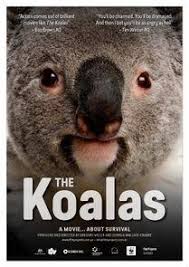
THE KOALAS
Australia, 2024, 91 minutes, Colour.
Directed by George Wallace-Crabbe, Gregory Miller.
Koalas, a great Australian favourite in the past, the genial character, Blinky Bill, were declared an endangered species on 12th of February 2022. Previously they had been classified as “vulnerable” and “threatened”. Australians became conscious of so many koalas being destroyed in the vast bushfires of 2019-2020.
This significant documentary opens with people gathering on the side of a road in at the National Park to view a koala on a tree. Admiration, curiosity, cameras. but also officials coming for rescue.to the. This is a film about the status of koalas, the destruction of their habitat, so often in the name of “development”, the need for rescue, veterinarian care, and a safety and survival campaign.
There is a particular focus here on Campbelltown and its surroundings, south of Sydney, an area with increasing ice and housing development, the clearing of land, cutting down trees. the clearing of forests. Throughout the film, there are visits to other parts of New South Wales, the focus on the survival of koalas in Victoria, and action in south-eastern Queensland.
The makers of the film have drawn on quite a number of concerned contributors, 30 to 40 making their appearance and voicing their concerns. They highlight the wide concern of the issues, range of volunteers, many belonging to organisations for protection of wildlife, scientists, politicians, engineers, all combining to make a 90 minute impact on the concerned audience.
There are quite a lot of images of the koalas themselves, time to look at them closely, their size, their ever-appealing faces, climbing the trees, squatting in the trees, continually munching (and some explanations about their love for gum trees, the toxins, their coping with them, effect on the environment). And throughout, quite a number of them are shown in close-up, and information given about their origins, their health, their survival in the bush. And, many statistics indicating how numbers are diminishing, the fires, so many becoming roadkill as they try to cross the highways, some diseases.
Which means there is quite some urgency behind the making of this film, an appeal to the Australian public to become aware of the situation, threatened species, endangered species, the threats from deforestation, logging, housing developments. Many of the advocates encourage dialogue between those concerned and governments, planners, scientists, experts on wildlife, protests and demonstrations, combat, but the possibilities of dialogue, especially with development companies, logging companies for positive outcomes.
While most of the campaigners are middle-aged and older, this film is also an appeal to younger audiences who are concerned about the environment, climate change, a better world.
Cold Copy
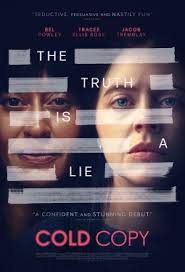
COLD COPY
US, 2023, 91 minutes, Colour.
Bel Powley, Tracee Ellis Ross, Jacob Tremblay, Nesta Cooper, Ekaterina Baker, James Tupper.
Directed by Roxine Helberg.
There are indications of journalistic ruthlessness in this title. And, reminders of that archetypal story about a star, career, decline and fall at the hands of an ambitious next-generation, All about Eve.
British actress, bel Powley, plays Mia Scott, a young journalism student who has had no other ambition than journalistic success since the death of her mother when she was eight. She goes to classes, study is the lecturer, harshly demanding successful journalist, Diane Higa, played to the arrogant hilt by Tracee Ellis Ross. Mia rehearses for an interview, is treated harshly, is resentful, declares that she is only after the truth but is seen to be betraying her friends, chosen by Diane who seems to see something of herself and the young Mia, and is usually demanding on.
By chance, Mia encounters a teenager, played by Jacob Tremblay (Room, Wonder) who has a sad story, a busy father, a mother dead by suicide, himself an artist, erratic in his behaviour. He then becomes the focus of Mia’s video project.
Mia is in no way sympathetic, any moments of sympathy are always for her own ends. And I and sees something of herself in the past in Mia.
There are ultimate betrayal is, Diane taking over me is peace. Mia getting revenge on Diane and humiliating her in public – the film ending with Diane’s knowing look at what Mia has done and Mia looking complacently. But, the audience knows, that in some years a new Mia will do the same to her.
- The title? Journalism? Commitment? Old and relentless?
- The background of American journalism, education of journalists, television programming and meetings, printed video, radio?
- The story of Mia Scott, her age, in college, ambitions, classes, him, her roommate, pollution for presentations, interviews, her rehearsing, attitudes towards Diane eager, the friend asking to present material, and not presenting it, the interview, the tough stances, Diane even tougher, hard, harsh, humiliating? Her throwing her presentation away?
- Diane, age and experience, seeing her in action, on screen, with executives and staff, her lectures, the demands? Later the background of the wine gift, her ex-husband, signing the house away, personal life and attitudes?
- Mia, number 20 on the list, accepted, Kim and her excitement, her contact at the politician’s office, information? Mia later using this, the anonymous phone call, the contact being sacked, sabotaging Kim’s career? And her later vengeance on Diane, taping her, giving the material to Kim, its being broadcast, the consequences for Diane, Mia watching her being interviewed and attacked by journalists?
- Mia, the meetings with Diane, Diane seeing something of herself in Mia, demanding, continually questioning expressions, getting near to say what she meant, her project, the critiques, further demands, Mia finally editing, Diane taking her in as an assistant, menial with the coffee, it also present – and the disillusionment that Diane presented her investigation has her own? Mia is violent response?
- Kim setting me up with the man, their walk, his approach, is violent matching reaction, Igor and coming to her rescue, first impressions, his age, his house, luxury, the absent father was business, the dead mother, the discovery of her reputation as a writer, a suicide?
- Igor, as a character, the effect of the suicide, the demands of his father, going to school spasmodically, taking Mia to the factory, the flour, his art?
- Mia taking him on this project, the news story, his wanting the story about himself, not about his mother, the family and their not revealing anything about the mother to the media? Mia and the interviews, filming him, even filming him attacked by the bullies? At home with him, his father’s arrival in ousting her? Her taking the key, going to the apartment, finding his mother’s final letter to him, “perfect boy”?
- , Editing it, her commentary? As a piece for television? Her excitement at its being presented, Diane taking it has her own?
- Memories of story like All about Eve, the ruthless star, career, memories of the past, fostering the up-and-coming potential star, then being undermined and betrayed? And the audience realising, while Mia doesn’t, that this same betrayal what happened to her in years to come?
Picasso, A Rebel in Paris
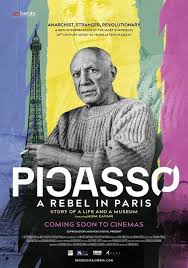
PICASSO: A REBEL IN PARIS – STORY OF A LIFE AND A MUSEUM / Picasso: Un ribelle a Parigi - Storia di una vita e di un museo
Italy, 2023, 93 minutes, Colour.
Mina Kavani.
Directed by Simona Risi.
This is a popular-audience-friendly documentary about the celebrated Spanish artist who moved to Paris in 1900 and made France the base for his career for the next seven decades.
The documentary is hosted by Iranian-born actress, Mina Barney, dubbed for the English version, empathising with Picasso as an exile from home country, explaining aspects of Picasso’s life, his art, sometimes addressing the audience over her shoulder, something of a commanding presence when she is on screen.
However, the film introduces quite a number of expert talking heads, especially in French, but with subtitles. They offer personal appreciation, technical information, perspectives on Picasso, life and art.
The immediate advantage of the film is placing Picasso in his historical context, born in Spain in 1881, his art studies in Spain, his moving to Paris and establishing himself there – with quite a number of photos of the young Picasso as well as some clips of the older man, especially his painting his signature – which is also the final scene of the film.
But, of course, the main advantage is the close-ups of so many of Picasso’s paintings and the information that he was not only prolific, he was more abundant, continually painting, keeping so many paintings himself. And the advantages of this when the French government set up a château as his Museum, it was able to house so many of his paintings, the camera sometimes roving through the museum.
And, there are some explanations of the changes in his career, his becoming part of the French establishment from the end of the 19th century into the 20th, friendship with, for example, Matisse, the development of Cubism, indications of his style in the early pieces and then the development of the multi-dimensional images with which audiences are so familiar.
There is some background to his own life, relationships, models.
But, this is a 90 minute documentary, an invitation to Picasso’s career, and audiences being able to follow up with Internet entries. And Picasso was portrayed in the film, Surviving Picasso, where he was played by Anthony Hopkins, 1996, directed by James Ivory.
Sins of the Father, The, Morse
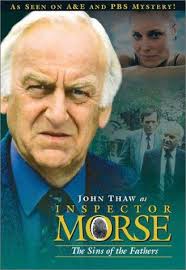
THE SINS OF THE FATHER
UK, 1990, 102 minutes, Colour.
John Thaw, Kevin Whatley.
Directed by Peter Hammond.
This is one of the later episodes in the long-running Morse series on British television, 33 episodes in all. This one is from 1990.
The familiar ingredients are there: the Oxford setting though not so much emphasised this time, Morse and his moods, reflective music, interrogations, always leaning on Lewis, but a variation in his attraction towards the doctor working on the autopsies, a date, some dancing, meeting again, music… The more humane face of Morse.
Focuses on a wealthy family, owners of a brewery, with 150 years tradition. However, one of the managers is found dead leading to problems with the finances of the family, the uncovering of relationships and passion, and a solution which takes the investigation back into the past generations of the family.
1. The popularity of the long-running series? Television movies? With style? The popularity of Morse and his personality, enigmatic and mannered style? The personality of Lewis? Their relationship? The solving of the crimes? Intricacy of the plot? The psychological dimensions, the mystery and clues? Police work and solving the mysteries with their own abilities? The work of Colin Dexter?
2.The Oxford settings, the city and landscapes, the cityscapes, the buildings? Comments about Oxford and Oxford society? The ironies about Oxford and the dons? The university city? Ordinary people? Their interconnections? So much beauty – and so much crime?
3.The quality of the mysteries, character-driven? Sufficient information, sufficient clues? The exploration of character and clues?
4.John Thaw as Morse, his personality, the changes over the years, yet remaining the same? The mystery of his name? His crusty manner, the bachelor (but romantic at times)? His own authority – exercised over Lewis – and his reaction to authorities? Promotion or not? The changing of his attitudes towards Lewis, bossing him, patronising him about education and culture? The issue of music? Drinking ale? His car? Quietly at home, at work? With Lewis, understanding the situations and characters, the deductions? His being a good listener – but critical?
5.The contrast with Lewis, the family man, the ordinary policeman, education and lack of education, his being put down by Morse – but enjoying his comeuppance now and again? Music and his ignorance? The first reactions, Lewis being patient? His admiration for Morse, having to do so much leg work, to formulate hypotheses? Working under pressure? Collaborator and partner of Morse?
6. The initial murder, the brewery, the difficulties, the letter from three years earlier, burnt? The takeover offer? The range of suspects?
7. The brewery, the death of Trevor, the revelations about his borrowing and deals, fraud? Stephen, technology, suspicions? George and the offer from the rival firm? Involvement? Weeks, his position in the brewery, continuing on, the board meeting and his willing see do it as directed to save the brewery? Victor, his work in the bureau, his relationship with Gail? The dramatisation of the characters, their suspicions, alibis?
- The family, aristocratic, Charles, his age, hearing, wheel chair? Yet alert, pride in his ancestors? Knowledge of the deals, his attitude? Relationship with his wife, her strong character, aristocratic, snobbish? The death of her children? Her liking Helen, her dislike of Lorraine? Wanting grandchildren? Her knowledge of the frauds/not?
- Victor, his mother, strong personality, his trains, the outings with Gail? His work?
- Morse and Lewis, working together, respected jobs, the interrogations, the family and the reactions, the people at the plant? Lewis and the discovery of all the historical documents, the explanation of the brewery, the partnership, the scandal, the blackmail?
- The revelation of the Crease connection, the solicitor, his death?
- The board meeting, the decisions about selling the brewery or not, the various stances, the boat?
- Stephen, his womanising, the relationship with Helen? The rendezvous, her finding his body? His wife, the swimming, the opera, strong-minded, her back story, the children?
- The revelation that Victor was the killer, the suspicions of his mother having kill the solicitor? The arrest?
- The drive home, the choice of vocabulary on the phone, Lewis and his observations, Morse turning round, the confrontation with the wife, her guilt, farewelling her husband?
- The title and the moral issues?
